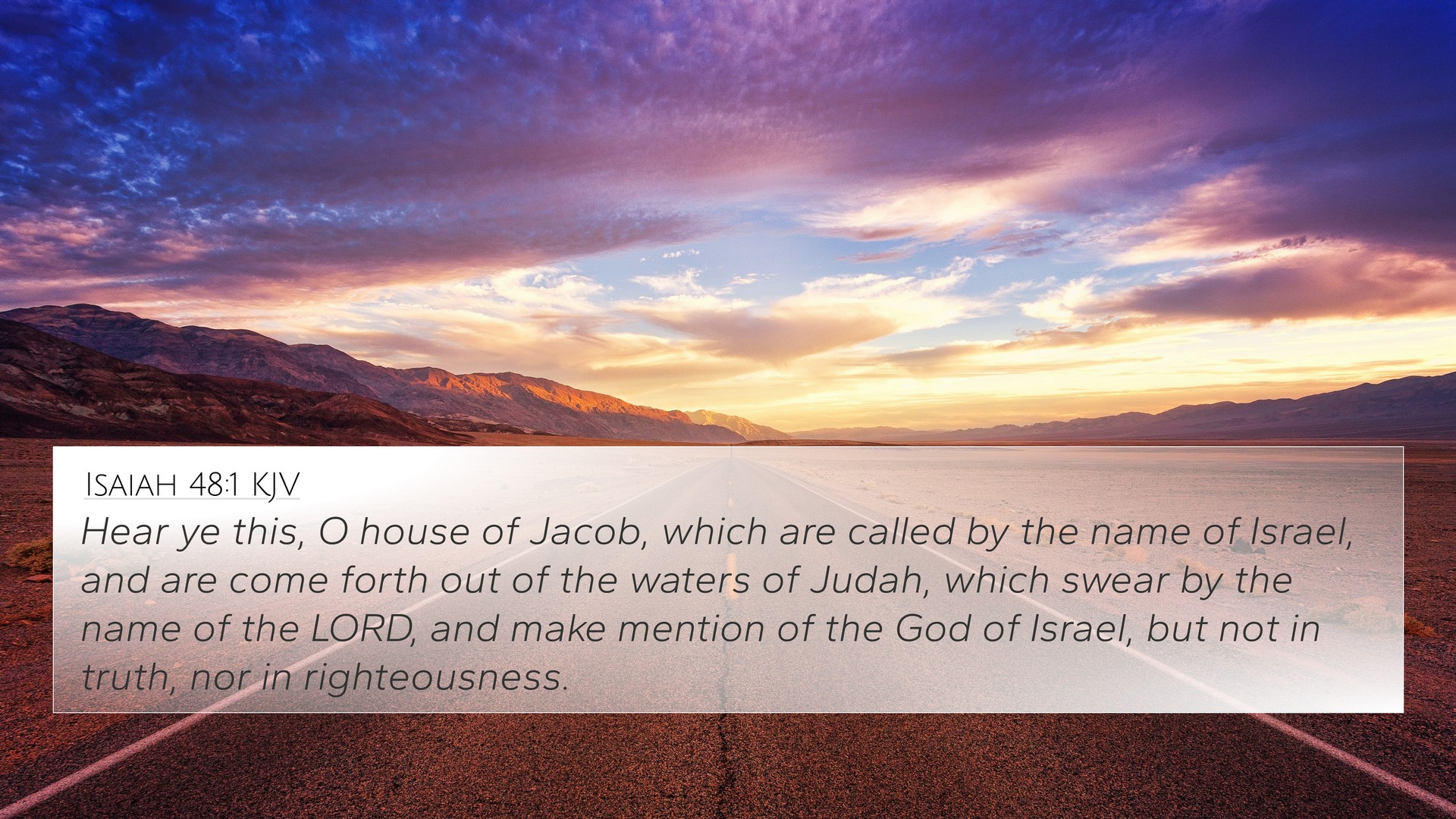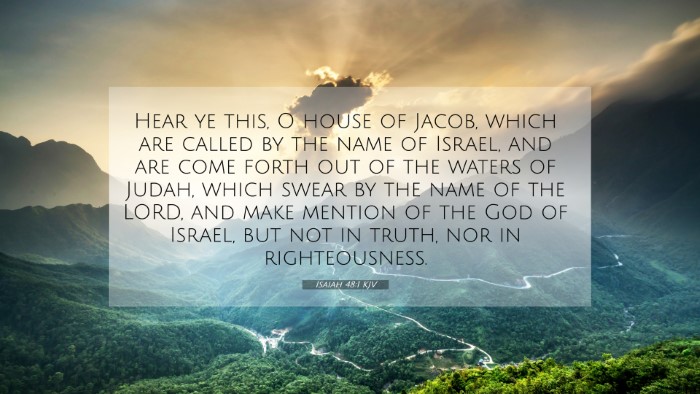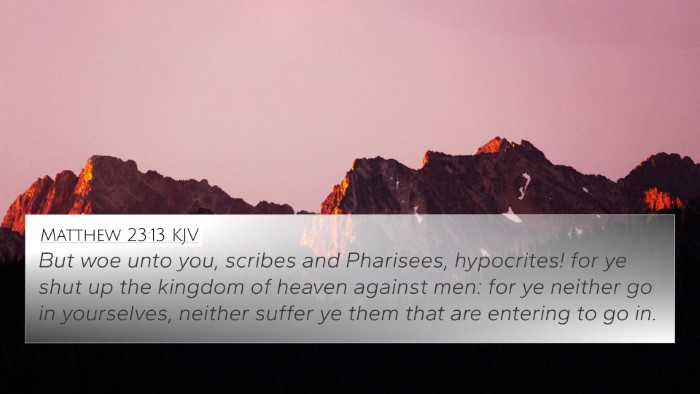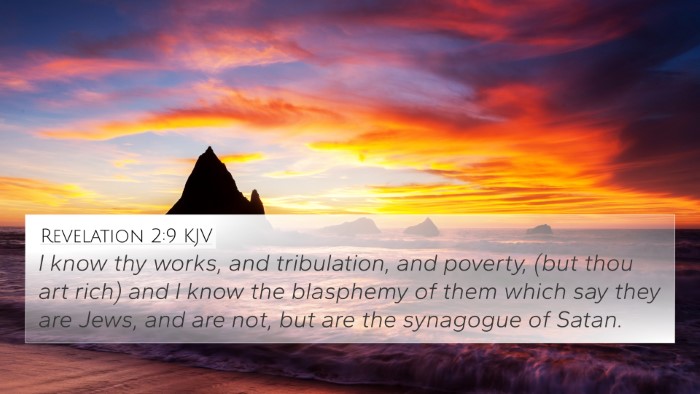Understanding Isaiah 48:1
Isaiah 48:1 states: "Hear ye this, O house of Jacob, which are called by the name of Israel, and are come forth out of the waters of Judah, which swear by the name of the Lord, and make mention of the God of Israel, but not in truth, nor in righteousness."
Overview
This verse serves as a call to the people of Israel, urging them to reflect on their identity and the reality of their relationship with God. It encapsulates key themes of identity, accountability, and authentic faith.
Key Themes
- Identity of the People: The phrase "house of Jacob" signifies the community of Israel, highlighting God’s covenant people.
- Invocation of God's Name: The people are identified as those who swear by God's name, emphasizing their acknowledgment of Him.
- False Worship: Despite calling God’s name, they do so "not in truth, nor in righteousness,” indicating a disconnect in their worship practice.
Bible Verse Cross-References
- Isaiah 29:13: "Wherefore the Lord said, Forasmuch as this people draw near me with their mouth, and with their lips do honor me, but have removed their heart far from me." - This verse reinforces the idea of superficial worship.
- Jeremiah 7:9-10: "Will ye steal, murder, and commit adultery, and swear falsely, and burn incense unto Baal, and walk after other gods whom ye know not?" - Identifies hypocrisy in worship practices.
- Micah 6:6-8: "Wherewith shall I come before the Lord, and bow myself before the high God?..." - Discusses what God truly desires from His people.
- Matthew 7:21: "Not everyone that saith unto me, Lord, Lord, shall enter into the kingdom of heaven; but he that doeth the will of my Father which is in heaven." - Echoes the theme of genuine obedience over mere profession.
- James 1:22: "But be ye doers of the word, and not hearers only, deceiving your own selves." - Emphasizes the necessity of following the truth.
- Romans 10:2: "For I bear them record that they have a zeal of God, but not according to knowledge." - Addresses zeal without understanding, paralleling Israel's situation.
- 1 John 2:4: "He that saith, I know him, and keepeth not his commandments, is a liar, and the truth is not in him." - A statement about the integrity of one’s claims regarding faith.
Insights from Commentaries
Matthew Henry's Commentary
Matthew Henry emphasizes that this verse serves as a rebuke to the Israelites for their half-hearted worship and lack of sincerity. He notes that calling themselves by God's name should incur a responsibility, compelling them to live in truth and righteousness. His commentary reflects on the juxtaposition of their identity as God's chosen people, yet their failure to embody that calling genuinely.
Albert Barnes' Commentary
Albert Barnes suggests that this exhortation aims to awaken the people to recognize their failures and spiritual blind spots. He points out that swearing by the name of the Lord while ignoring His commands constitutes hypocrisy. This commentary underscores the need for true devotion and obedience as essential characteristics of genuine faith.
Adam Clarke's Commentary
Adam Clarke elaborates on the consequences of Israel's insincere worship, noting that God seeks a heartfelt commitment rather than mere ritualistic observance. He highlights the duality within the community, wherein people proclaimed their allegiance to the God of Israel, yet acted contrary to His statutes. Clarke elucidates that God calls His people to a higher standard of integrity in their faith.
Thematic Connections
The thematic connections stemming from Isaiah 48:1 extend across various books of the Bible, underscoring a continuous dialogue regarding human nature, accountability, and divine expectations. Recognizing how these themes are woven throughout Scripture can deepen understanding and enhance one's approach to Scripture study.
Tools for Bible Cross-Referencing
Engaging with cross-referenced biblical texts is essential for in-depth Bible study. Here are some helpful resources:
- Bible concordance - aids in locating specific verses and their cross-references.
- Bible cross-reference guide - provides systematic connections between related scriptures.
- Cross-reference Bible study methods - can enhance one’s understanding of inter-textual themes.
- Bible reference resources - offer comprehensive essays and reviews of biblical themes.
- Bible chain references - illustrate the links between verses in a sequenced format.
Conclusion
Isaiah 48:1 challenges believers to assess their spiritual sincerity and align their worship with truth and righteousness. Through the insights offered in various commentaries and across related Scriptures, it's evident that this call is relevant for all ages. Engaging with the Bible through cross-references enlightens the readers about the profound connections within God’s message across both the Old and New Testaments. In doing so, believers can cultivate a more authentic and impactful faith journey.


























